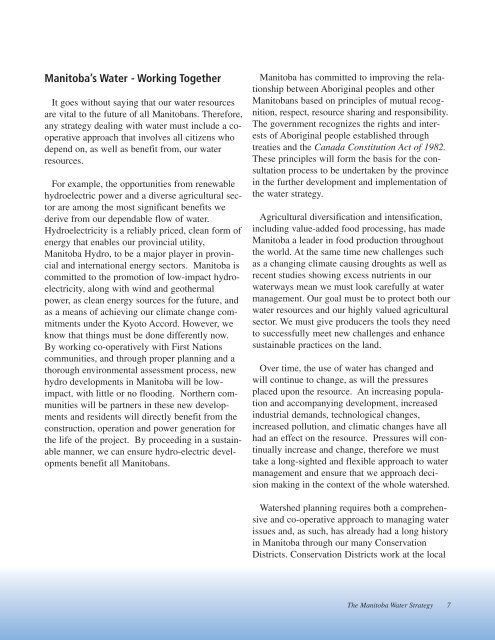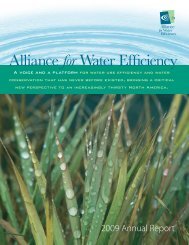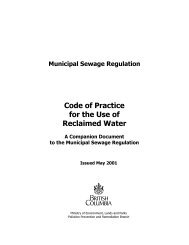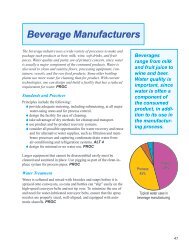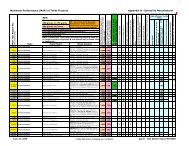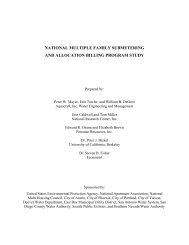The Manitoba Water Strategy - Government of Manitoba
The Manitoba Water Strategy - Government of Manitoba
The Manitoba Water Strategy - Government of Manitoba
Create successful ePaper yourself
Turn your PDF publications into a flip-book with our unique Google optimized e-Paper software.
<strong>Manitoba</strong>’s <strong>Water</strong> - Working Together<br />
It goes without saying that our water resources<br />
are vital to the future <strong>of</strong> all <strong>Manitoba</strong>ns. <strong>The</strong>refore,<br />
any strategy dealing with water must include a cooperative<br />
approach that involves all citizens who<br />
depend on, as well as benefit from, our water<br />
resources.<br />
For example, the opportunities from renewable<br />
hydroelectric power and a diverse agricultural sector<br />
are among the most significant benefits we<br />
derive from our dependable flow <strong>of</strong> water.<br />
Hydroelectricity is a reliably priced, clean form <strong>of</strong><br />
energy that enables our provincial utility,<br />
<strong>Manitoba</strong> Hydro, to be a major player in provincial<br />
and international energy sectors. <strong>Manitoba</strong> is<br />
committed to the promotion <strong>of</strong> low-impact hydroelectricity,<br />
along with wind and geothermal<br />
power, as clean energy sources for the future, and<br />
as a means <strong>of</strong> achieving our climate change commitments<br />
under the Kyoto Accord. However, we<br />
know that things must be done differently now.<br />
By working co-operatively with First Nations<br />
communities, and through proper planning and a<br />
thorough environmental assessment process, new<br />
hydro developments in <strong>Manitoba</strong> will be lowimpact,<br />
with little or no flooding. Northern communities<br />
will be partners in these new developments<br />
and residents will directly benefit from the<br />
construction, operation and power generation for<br />
the life <strong>of</strong> the project. By proceeding in a sustainable<br />
manner, we can ensure hydro-electric developments<br />
benefit all <strong>Manitoba</strong>ns.<br />
<strong>Manitoba</strong> has committed to improving the relationship<br />
between Aboriginal peoples and other<br />
<strong>Manitoba</strong>ns based on principles <strong>of</strong> mutual recognition,<br />
respect, resource sharing and responsibility.<br />
<strong>The</strong> government recognizes the rights and interests<br />
<strong>of</strong> Aboriginal people established through<br />
treaties and the Canada Constitution Act <strong>of</strong> 1982.<br />
<strong>The</strong>se principles will form the basis for the consultation<br />
process to be undertaken by the province<br />
in the further development and implementation <strong>of</strong><br />
the water strategy.<br />
Agricultural diversification and intensification,<br />
including value-added food processing, has made<br />
<strong>Manitoba</strong> a leader in food production throughout<br />
the world. At the same time new challenges such<br />
as a changing climate causing droughts as well as<br />
recent studies showing excess nutrients in our<br />
waterways mean we must look carefully at water<br />
management. Our goal must be to protect both our<br />
water resources and our highly valued agricultural<br />
sector. We must give producers the tools they need<br />
to successfully meet new challenges and enhance<br />
sustainable practices on the land.<br />
Over time, the use <strong>of</strong> water has changed and<br />
will continue to change, as will the pressures<br />
placed upon the resource. An increasing population<br />
and accompanying development, increased<br />
industrial demands, technological changes,<br />
increased pollution, and climatic changes have all<br />
had an effect on the resource. Pressures will continually<br />
increase and change, therefore we must<br />
take a long-sighted and flexible approach to water<br />
management and ensure that we approach decision<br />
making in the context <strong>of</strong> the whole watershed.<br />
<strong>Water</strong>shed planning requires both a comprehensive<br />
and co-operative approach to managing water<br />
issues and, as such, has already had a long history<br />
in <strong>Manitoba</strong> through our many Conservation<br />
Districts. Conservation Districts work at the local<br />
<strong>The</strong> <strong>Manitoba</strong> <strong>Water</strong> <strong>Strategy</strong><br />
7


